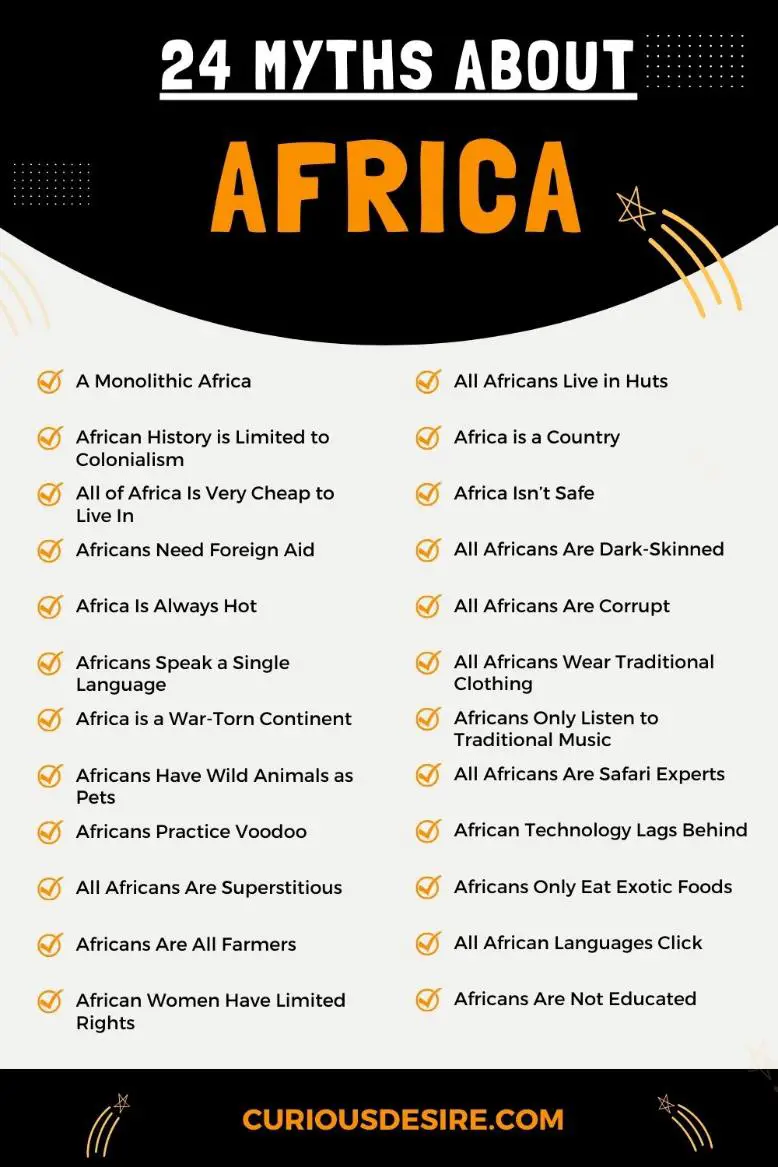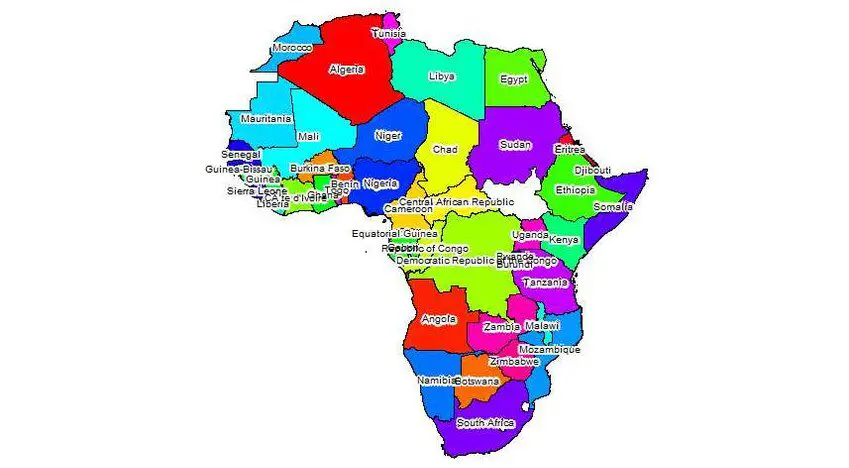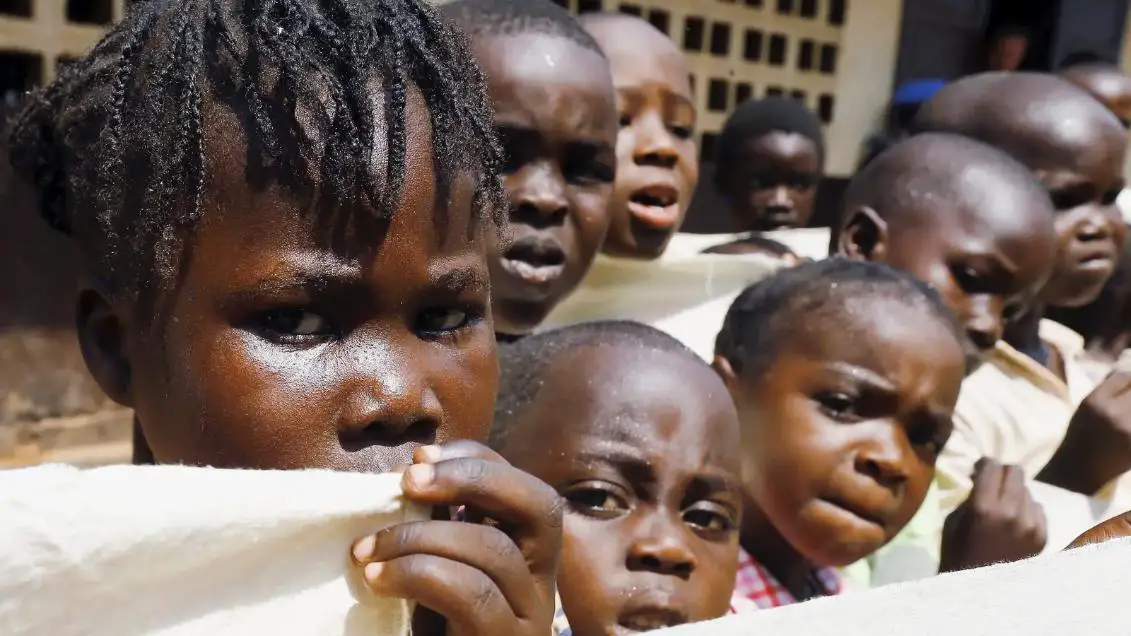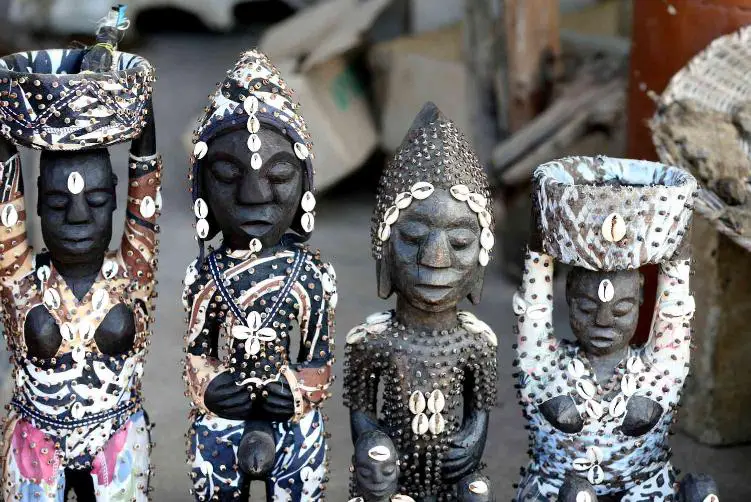Africa is a diverse place with many different cultures and histories. But sometimes, people believe things about Africa that are not true.
These ideas can make it hard to really understand what Africa is like.
In this article, we will look at some of these wrong ideas, or myths about Africa. We want to show what Africa is really like and break down these wrong thoughts.
5 Most Common Myths About Africa:
- Africa is a Country
- All Africans Live in Poverty
- Africans Only Speak One Language
- Africa is a War-Torn Continent
- Africans Live in Traditional Huts
[toc]

Myth 1: The Myth of a Monolithic Africa
Why the Myth Exists:
It is commonly believed that Africa is all the same because they don’t know much about the different parts of the continent.
This misunderstanding started a long time ago at the time of European colonization.
Back then, these European powers treated all the diverse cultures and groups in Africa as if they were one big group.
This idea stuck around, and even in movies, schools, and popular stories, Africa was shown as one big, similar place.
Debunking the Myth:
Africa is incredibly diverse, with over 3,000 ethnic groups and more than 2,000 languages spoken. The continent’s vastness includes a wide range of landscapes, climates, and cultural practices.
It is essential to recognize the uniqueness of each African country and its people.
Highlighting Africa’s diversity helps break the idea that it’s all the same and encourages a better, more respectful understanding of the continent’s mix of cultures, traditions, and histories.
Myth 2: All Africans Live in Huts
Why the Myth Exists:
This stereotype comes from looking at Africa mainly from a European viewpoint, which sees the continent as if it’s stuck in the past, only living in traditional, rural ways.
Pictures of countryside villages with traditional homes are often shown a lot in Western media.
This makes it seem like this is how everyone in Africa lives, but that’s not true for the whole continent.
Debunking the Myth:
Even though traditional homes are found in certain rural places, Africa is also home to vibrant cities with modern buildings and infrastructure.
Big cities all over the continent have tall skyscrapers, advanced transportation systems, and modern homes.
Pointing out the urbanization and technological progress in Africa challenges the idea that the continent is only about traditional rural living.
Myth 3: African History is Limited to Colonialism
Why the Myth Exists:
The misconception that African history is limited to colonialism came from historical biases and Eurocentric perspectives that have often marginalized the pre-colonial contributions of African societies.
During the colonial era, European powers dominated Africa, shaping narratives that centered on their exploits and downplayed the rich and diverse history of the continent before their arrival.
This way of thinking, called Eurocentric, made people believe that Africa didn’t have its own important history and wasn’t significant before the European countries took over.
Debunking the Myth:
Africa boasts a vast and complex history that extends far beyond the colonial period. Ancient civilizations such as the Kingdom of Kush, Mali Empire, Great Zimbabwe, and Axum Empire thrived on the continent, contributing to advancements in agriculture, architecture, art, and trade.
The myth is debunked by emphasizing the pre-colonial achievements, highlighting the organized political systems, cultural diversity, and economic prosperity that characterized various African regions.
Trade routes, such as the Trans-Saharan trade and the Indian Ocean trade, connected Africa to the world, encouraging the sharing of cultures and helping economies grow.
The Great Library of Alexandria in Egypt and the city of Timbuktu in Mali were centers of learning and knowledge that played crucial roles in the intellectual history of the world.
Recognizing that African history didn’t just start with other countries taking over challenges the simple idea that it’s all about colonization.
It is important to promote a more accurate understanding of Africa’s past, recognizing the agency and resilience of African societies throughout various historical epochs.
Myth 4: Africa is a Country
Why the Myth Exists:
The notion that Africa is a single country instead of a vast continent is rooted in geographical ignorance and a Eurocentric worldview.
This often arises from a lack of emphasis on global geography in education, coupled with media portrayals that neglect to differentiate between African countries.
Debunking the Myth:
Africa comprises 54 countries, each with its own diverse culture, history, and governance.
Educating people about Africa’s diverse nations and their unique characteristics can help to clear up any prejudices about this beautiful continent.
Myth 5: It Is Very Cheap to Live In Africa
Why the Myth Exists:
This myth may have originated from a generalization about the economic conditions of some African countries that face challenges such as poverty and underdevelopment.
Debunking the Myth:
While it is true that some areas in Africa may have a lower cost of living compared to certain Western countries, it is inaccurate to think that the cost of living is universally low across the entire continent.
Africa is diverse, with countries exhibiting a wide range of economic conditions. Some cities in Africa, especially those with high populations or strong economic growth, can be quite expensive.
It’s essential to recognize the economic diversity within Africa and avoid such generalizations.
However, it is important for the people who are deciding to move or travel to a new place, to research specific regions to get an accurate understanding of the local economic conditions.
Myth 6: You Are Not Safe Africa
Why the Myth Exists:
Negative stereotypes and media often focus on conflicts, wildlife dangers, and infectious diseases, contributing to the misconception that Africa is universally unsafe.
This oversimplified view neglects the fact that many African countries and regions are peaceful and welcoming to visitors.
Debunking the Myth:
Safety varies widely across Africa. While there are regions with security concerns, other countries boast stable environments and vibrant tourist destinations.
Africa has popular travel destinations known for their safety and hospitality.
But again it’s crucial to research specific countries and regions, follow travel advisories, and take necessary precautions, just as one would when traveling to any part of the world.
Myth 7: There Is a Need for Foreign Aid in Africa
Why the Myth Exists:
Historically, some African nations faced challenges such as famine, disease, and political instability, leading to international aid initiatives.
However, the idea that all of Africa is perpetually dependent on foreign aid overlooks the continent’s diverse economic landscape.
Debunking the Myth:
Many African countries have made impressive progress in economic development and self-sufficiency.
Africa is witnessing growing economies, innovative industries, and successful businesses.
Although foreign aid remains important in specific cases, it’s essential to understand that it doesn’t apply universally across the entire continent.
Recognizing the achievements and economic potential of different African nations is required to have a clearer picture of Africa.
Myth 8: All Africans Are Dark-Skinned
Why the Myth Exists:
The assumption that all Africans have dark skin likely comes from a lack of understanding of the continent’s diversity. Stereotypes and historical misrepresentations contribute to this oversimplification.
Debunking the Myth:
Africa is home to a vast array of ethnic groups, each with its distinct physical characteristics. Skin tones in Africa vary widely, from dark brown to lighter shades.
Additionally, migration and historical interactions have introduced people with various skin tones to different regions of Africa.
Acknowledging the variety of skin tones within African populations is important in debunking this myth and promotes a more precise understanding of the continent.
Myth 9: It Is Always Very Hot in Africa
Why the Myth Exists:
This false belief likely results from the association of Africa with the Sahara Desert and other arid regions.
The emphasis on the continent’s warmer climates often leads to a broad misunderstanding that all of Africa has hot weather.
Debunking the Myth:
The climate in Africa is incredibly diverse, encompassing tropical rainforests, arid deserts, savannas, and temperate highlands.
Some regions, particularly those closer to the equator, have consistently warm temperatures, but others experience seasonal variations, including cooler temperatures and even snowfall.
Myth 10: There is Inherent Corruption in All Africans
Why the Myth Exists:
Media reports frequently spotlight instances of corruption in certain African countries, adding to the view that corruption is widespread across the entire continent.
Debunking the Myth:
Corruption exists in varying degrees globally, and Africa is no exception. However, it is inaccurate and unfair to paint an entire continent with a broad brush.
Many African countries have implemented anti-corruption measures, and there are instances of positive leadership and governance.
Understanding the varied political landscapes and governance efforts is essential to change the notion that all Africans are corrupt.
Myth 11: Africans Speak a Single Language
Why the Myth Exists:
The misconception that Africans speak a single language may result from a lack of awareness about Africa’s linguistic diversity.
Western media often fails to highlight the multitude of languages spoken across the continent, contributing to this belief that Africans communicate in a uniform manner.
Debunking the Myth:
Africa is incredibly diverse when it comes to languages, with over 2,000 spoken across different language families.
This variety challenges the idea that there’s just one language for the entire continent.
When we look at specific languages like Swahili, Hausa, Yoruba, Zulu, and Arabic, it becomes clear that there’s a rich linguistic tapestry in Africa.
Understanding this mix of languages helps us appreciate how diverse and complex Africa’s cultures are.
Myth 12: All Africans Wear Traditional Clothing
Why the Myth Exists:
The stereotype that all Africans wear traditional attire may arise from selective representations of Africans that emphasize cultural festivals and ceremonies.
These portrayals overlook the everyday diversity in clothing styles worn in urban areas.
Debunking the Myth:
While traditional clothing is important in many African cultures, contemporary fashion in urban areas reflects a blend of traditional and Western styles.
Major cities host fashion weeks, and designers draw inspiration from various cultural influences.
Myth 13: Africa is a War-Torn Continent
Why the Myth Exists:
This notion that all of Africa is engulfed in conflict is rooted in biased media coverage that disproportionately highlights instances of political instability and violence.
This one-sided portrayal reinforces this notion of Africa as a continent perpetually at war, neglecting the regions experiencing peace and development.
Debunking the Myth:
While conflicts have occurred in Africa, it’s important to note that the continent is not universally defined by warfare.
Several African countries have very stable governments, thriving economies, and peaceful societies.
Clearing this misconception requires focusing on success stories, featuring regions marked by political stability and economic growth, and highlighting the varied narratives that contribute to Africa’s geopolitical landscape.
Myth 14: Everyone Listens to Traditional Music in Africa
Why the Myth Exists:
The view that Africans exclusively listen to traditional music stems from a narrow representation of African musical diversity in global media.
This oversight often results in the oversimplified perception that traditional drumming and tribal tunes are the sole musical expressions across the continent.
Debunking the Myth:
African music spans a broad spectrum, encompassing genres such as Afrobeat, highlife, hip-hop, jazz, and various traditional music styles.
Internationally acclaimed artists from Africa contribute to the global music scene, showing the continent’s musical diversity.
Myth 15: People Have Wild Animals as Pets in Africa
Why the Myth Exists:
This stereotype likely originates from a romanticized and outdated view of Africa as a continent where people coexist with wild animals in their daily lives.
Images from wildlife documentaries may contribute to the belief that Africans commonly keep exotic animals as pets.
Debunking the Myth:
Several African countries have strict regulations and laws governing the ownership of wild animals as pets, designed to safeguard both the animals and the public.
Possessing a wild animal as a pet without proper permits is frequently illegal and can lead to severe consequences.
Rather than perpetuating such beliefs, it is vital to underscore the substantial efforts made by many African nations in wildlife conservation.
These countries host numerous national parks, game reserves, and conservation initiatives aimed at preserving the natural habitats of wild animals.
Myth 16: All Africans Are Safari Experts
Why the Myth Exists:
The misunderstanding that all Africans are safari experts may result from the global association of Africa with iconic wildlife and safari experiences.
This depiction of Africans neglects the diverse interests and lifestyles of people across the continent.
Debunking the Myth:
While some Africans are indeed involved in wildlife conservation and tourism, many pursue careers in technology, business, arts, and various other fields unrelated to safaris.
Recognizing the impact of urbanization and modern lifestyles in Africa is crucial. Many Africans live in bustling cities, where their daily lives revolve around contemporary activities rather than safari-related expertise.
So we can say that not every African is an expert, there are individuals who specialize in guiding safari experiences.
Myth 17: Africans Practice Voodoo
Why the Myth Exists:
The myth that all Africans practice voodoo stems from a misrepresentation and oversimplification of traditional African spiritual practices.
Western media, particularly in movies and literature, often portray African religions, including Voodoo, in a negative light.
This misrepresentation contributes to the prejudice that voodoo is a universal practice across the continent.
Debunking the Myth:
To bust this myth, it’s essential to emphasize the religious diversity in Africa. The continent is home to various belief systems, including Christianity, Islam, and a myriad of indigenous religions.
Voodoo itself is specific to certain regions, primarily in West Africa and its diaspora.
Acknowledging the variety of religions in Africa helps break the stereotype that all Africans follow voodoo, promoting a more detailed understanding of the continent’s spiritual diversity.
Myth 18: Technological Development in Africa Lags Behind Global Advancements
Why the Myth Exists:
This belief is rooted in historical biases and a lack of awareness about the technological advancements occurring across Africa.
Stereotypes about poverty and underdevelopment contribute to the belief that the entire continent lags behind in technology.
Debunking the Myth:
Contrary to this view, Africa has experienced significant technological progress.
Many African countries have embraced modern technology, with thriving tech industries, innovation hubs, and increasing internet connectivity.
Initiatives such as mobile banking, e-commerce, and tech startups are thriving.
Myth 19: There Are Beliefs in Superstitions Across Africa
Why the Myth Exists:
The idea that all Africans are superstitious is rooted in cultural misunderstandings and biased perspectives. It oversimplifies the diverse religious and cultural beliefs found across the continent.
Debunking the Myth:
In Africa, many people follow organized religions like Christianity and Islam, and superstitions are found across various regions and cultures.
Understanding the variety of religious practices provides a clearer and more accurate view of the diverse beliefs held by the people in Africa.
This goes beyond the misconceptions often linked to them, such as superstitions.
Myth 20: Africans Only Eat Exotic Foods
Why the Myth Exists:
This notion may arise from a limited understanding of African cuisine, often influenced by biased narratives that exoticize certain dishes.
Debunking the Myth:
African cuisine is rich and varied, encompassing traditional, modern, and international influences.
In cities, people enjoy a wide array of foods, including fast food.
Dismissing this misconception means highlighting the diverse culinary landscape in Africa and questioning the idea that Africans only eat exotic or unfamiliar foods.
Myth 21: All Habitants of Africa Are Farmers
Why the Myth Exists:
The stereotype that portrays all Africans as farmers may stem from an outdated and simplistic perspective of Africa, primarily linking the continent with agriculture and overlooking the diverse range of activities and professions people are involved in beyond farming.
Debunking the Myth:
The notion that all Africans are farmers is a gross oversimplification of the diverse economic activities across the continent.
While agriculture is a significant sector in many African economies, millions of Africans work in a wide range of professions and industries.
Urban areas in Africa are making advances in sectors such as technology, finance, healthcare, manufacturing, and the arts.
It is essential to recognize the multifaceted nature of African economies and move beyond stereotypes that limit the understanding of the continent’s economic diversity.
Myth 22: There Are Specific Clicking Sounds In All African Languages
Why the Myth Exists:
This overly simplified view that all African languages involve clicking sounds likely originated from the prominence of click consonants in some southern African languages, such as Xhosa and Zulu. This belief ignores the vast linguistic diversity present on the continent.
Debunking the Myth:
While click consonants are indeed a feature in some southern African languages, it is a misconception to generalize this characteristic to all African languages.
Africa is linguistically diverse, having various language families and linguistic structures.
Many African languages do not incorporate clicks, and their phonetic characteristics vary widely.
Assuming that all African languages involve clicks generalizes the diverse linguistic richness found in various regions of the continent.
Myth 23: There Are Limited Rights For African Women
Why the Myth Exists:
This false narrative that African women have limited rights may arise from biased portrayals of Africa and a lack of awareness about the progress made in women’s rights across the continent.
Debunking the Myth:
It is a false assumption that African women universally have limited rights.
While some African countries face challenges related to gender inequality, it’s important to note that substantial progress has been made in advancing women’s rights across the continent.
Many African nations have implemented legal reforms, affirmative action policies, and social initiatives to empower women. Women in Africa actively participate in various fields, including politics, business, education, and the arts.
Generalizing limitations on the rights of African women oversimplifies the complex and diverse landscape of women’s experiences and achievements in different African societies.
Acknowledging both challenges and progress is essential for a more accurate understanding of the status of women’s rights in Africa.
Myth 24: There Is no Education In Africa
Why the Myth Exists:
This biased view, like many others, arises from historical biases and limited awareness of the diverse educational landscape in Africa.
The perpetuation of a singular narrative emphasizing poverty and underdevelopment further contributes to the misconception that Africans are not educated.
Debunking the Myth:
The myth that Africans are not educated is a misrepresentation of the educational landscape in Africa.
Numerous universities and educational institutions operate across the continent, offering a wide range of academic disciplines.
Many Africans pursue higher education both within the continent and internationally, contributing to various fields such as science, technology, arts, and humanities.
Education is highly valued in many African societies, with parents often making significant sacrifices to ensure their children receive quality education.
Myths About Africa – FAQs
What is the most famous African myth?
Identifying the “most famous” African myth is challenging, given the diversity of cultures and traditions across the continent.
However, one of the well-known myths is the creation story of the Yoruba people in Nigeria, which involves the supreme god, Olorun, and the primordial beings, Oduduwa and Obatala.
Another notable myth is the tale of Anansi, the trickster spider, prevalent in West African folklore.
What are myths in African tradition?
Myths in African tradition are narrative expressions of cultural beliefs, explaining the origin of the world, natural phenomena, and the customs and practices of a community.
They often feature gods, spirits, and legendary figures, serving as a means to pass down cultural values, history, and moral lessons from generation to generation.
What are 5 interesting facts about Africa?
- Africa is the second-largest and second-most-populous continent on Earth.
- The Sahara Desert, the world’s largest hot desert, spans several African countries.
- Africa is home to the Nile River, the longest river globally, and the diverse landscapes of the Great Rift Valley.
- The continent boasts a rich biodiversity, with numerous unique species of flora and fauna.
- Africa is linguistically diverse, with over 2,000 languages spoken across its 54 countries.
What is the creation myth of Africa?
There isn’t a singular creation myth for all of Africa, given its diverse cultures. However, one example is the Yoruba creation myth, where the supreme god, Olorun, sends Oduduwa and Obatala to create the Earth.
Oduduwa becomes the ancestor of the Yoruba people, and Obatala shapes humanity out of clay.
What are Western stereotypes about Africa?
- Poverty and Disease: Africa is often stereotyped as a continent plagued by poverty, famine, and infectious diseases.
- Wildlife and Safaris: The perception that Africa is primarily a vast, untamed wilderness with safaris as the main attraction.
- War and Conflict: Misconceptions about Africa being a war-torn continent, overshadowing regions of stability and growth.
- Cultural Homogeneity: Viewing Africa as a culturally homogeneous entity, ignoring its diverse ethnicities and traditions.
- Technological Backwardness: A stereotype that portrays Africa as technologically backward, overlooking advancements in various fields.
What are the African stereotypes in movies?
- Stereotypical Characters: African characters are often portrayed through clichéd roles, such as the noble savage or exotic mystic.
- Monolithic Representation: Africa is sometimes depicted as a single, homogenous entity rather than a continent with diverse cultures.
- Focus on Poverty: Movies may disproportionately highlight poverty and struggles, perpetuating a one-dimensional narrative.
- Violent Narratives: Some films emphasize conflict and violence, contributing to the misconception of a war-torn continent.
- Limited Perspectives: Lack of diverse African narratives, often featuring Western-centric perspectives on African stories.
What are the misconceptions about African history?
- Colonial-Centric Narratives: Focusing solely on the colonial era, overlooking Africa’s rich pre-colonial history and civilizations.
- Primitive Stereotypes: Misconceptions that African societies were primitive before European colonization, disregarding advanced cultures and achievements.
- Homogeneity of Cultures: Assuming all African cultures are similar, ignoring the vast diversity in languages, customs, and traditions.
- Ignoring Ancient Civilizations: Overlooking Africa’s contributions to early civilizations, such as the Kingdom of Kush, Carthage, and Great Zimbabwe.
- Ignoring Cultural Achievements: Disregarding the significant contributions of African societies to art, science, mathematics, and philosophy throughout history.



